#Empowering portrayal
Text

beautiful women James
"Feminine Allure in Frames: The Captivating Portraits of Beautiful Women by James."
#Timeless elegance#Inner confidence#Captivating charm#Radiant beauty#Empowering portrayal#Natural grace#Diverse representation#Individuality celebrated#Portrait photography#Striking features#Empowered women#Artistic interpretation#Unique perspectives#Creative captures#Feminine essence#pretty woman#beautiful women#pretty girl
0 notes
Text
one small post from hiatus to simply say how much I adored barbie. As a plus sized girl when I saw the plus sized barbie so beautifully adorned in her outfit I wanted to cry, and how barbie sat with the old woman at the bench, how she met her creator, how Ruth gave that speech about being a woman...this movie will be engraved into my memory forever. Its perfect, I love you barbie. I can speak for hours on how beautifully written it is and how much depth there is to it, but God.
#barbie#it ruined me in such a good way#i love barbie in the sense that its such an empowering movie with its feminist ideals#i love barbie also in the sense its so relatable in such a bittersweet way#i love barbie in the sense that barbie gets scared of aging and cellulite but when she sees an old woman for the very first time#she thinks shes beautiful#and it ruins me#it ruins me so much because i love it so much#i cried#watch barbie guys#please#i love barbie in the sense that ken is such a realistic character portrayal of how a boy grows up differently than a girl does#and how in the end even after ken fucks it all up barbie still blames herself#i saw so many other posts on barbie and tiktok stuff and god#barbie? more like i love you#i love you so much barbie#wtf#should i watch more greta gerwig movies? deffo.#love you barbie#hi barbie!#bye barbie!
11 notes
·
View notes
Text
The birth scene of Eve is so special to me, a woman who loves seeing two moms. Just show the weirdos that deny a queer Xena and Gabrielle THAT scene.
That is a married couple having a baby together, your honor. (As all these Greek gods try to murder said baby. Hercules is there. No Iolus tho wtf. Gabrielle refusing to leave Xena 😭).

#gabrielle is the best daddy#Puts up with Xenas sass#xena warrior princess#is xena the most empowering portrayal of a pregnant woman?#answer is YES
16 notes
·
View notes
Text
i think a lot of the reason i cannot shut up here is i feel genuinely secure in my portrayal like,,, clearly i am taking my liberties but i think i Get his characterization pretty well. and he curled up and made a nest in my brain like some kind of creature about it.
#i forgot where i was going with this post. it fell apart. it's very late#the moral of the story is i feel comfy in my portrayal and it is very empowering aodna#out of character.
3 notes
·
View notes
Note
How do you feel when people call Amy a stalker?
People can call her what they want, however…
Do i think it's fair to call Amy a stalker?
In some of the games? Yes, and even in some of the ones she wasn't a stalker per-se, she still showed possessive and obsessive tendencies. So i get where it comes from...
Generally? No. Her character originally wasn't supposed to be a harasser and she sure isn't one in the present. the franchise has been clearly trying to do better for her these past few years.
I think Amy's changing characterization is an interesting topic of discussion, so even though i technically already answered your question i'll take this chance and proceed to talk about my fave for way longer than i need to :).
Note: This is just my take on Amy and the way i understand her ENGLISH PORTRAYAL. I won't be talking about her japanese one which would deserve its own analysis.
Sorry for any writing mistakes in advance (english is hard) and feel free to correct me if i'm factually wrong about something (i wrote this thing mostly from memory so i imagine i must be.)
Amy has changed A LOT troughout the games and has been in the hands of many different writers across Sonic media ,so when talking about her is important to be specific about what game,series or comic we are talking about (and language),and while i know that some of you might not agree and i respect that, i think that -looking at the subtleties- Amy has had at least 6 different portrayals through the course of the games. That being said,i believe the idea that she is a stalker comes especifically from the characterization they started giving her around 2003
Originally,Amy was envisioned as a sweet 12-year-old kid who had a huge unreciprocated crush on her idol and a passion for fortune-reading ,but who wasn't exactly much of a heroine herself. In the classic era,her place in the narrative was just to serve as a damsel in distress and a cute,funny detail. Ofc,in comics and animated shorts for games like Origins, we have gotten more content of classic Amy being fully independent and capable of defending herself (even more with the upcoming playable mode for her in Origins Plus), but i think we can all see how such aspects of her character weren’t included at the time she was created (only exception being Sonic Fighters)
Especifically in the adventure era (AKA the birth of modern Amy) they gave Amy her iconic strong,compassionate,romantic personality and an interest/love for adventure (and her sassy attitude ofc). She's outspoken,stubborn,brave and honest. I also want to point out that in this first portrayal ,her love for Sonic feels more like innocent childish idolization than an obsession and that her character doesn't revolve exclusively around it (she will stand in his way if she doesn't think what he does is right). Tbh i think she's incredibly funny,cool and lovable,

They slowly started planting the seeds for her character to stop being a "damsel in distress" by making her playable and defeat ZERO all on her own at the end of SA1,then also being playable in Sonic advance and helping Sonic get out of prison in SA2 (and tagging along for the rest of the adventure). In all these games,her character revolves around empathy,optimism and kindness. The way she protects the flicky since the moment she finds it,how she defends Gamma from Sonic and the iconic moment in SA2 where she convinces Shadow to help save earth are all great examples.
THEN, in Heroes , they decided to try something new with her taking her confidence and sassy attitude to a whole other level. Giving her the chance to be a fully-fleshed hero who didn't need rescuing anymore. She became independent and the leader of her own team of friends who she wanted to help. I love this Amy cause she feels really strong,determined and empowered without losing her peppiness,silliness,positivity and kindness. Her flaws are also especially endearing to me: How much of a wild kid she is,How even if she means well, she relies way too much in brute force, How she has trouble getting out of her own head, etc. She really feels just as confident and energic as Sonic,but just like him,you can tell she has a huge heart.

HOWEVER, as much as i love how they made her strength and bravery shine in this game, Heroes was the game that gave birth to the idea that Amy is willing to chase and even fight Sonic just to insist that they should marry (in SA2 she did follow him to the prison but it was only to help him and tag along in the adventure).
Ofc this was supposed to be comedic and to be seen as childish,harmless behavior- I say this because the rest of the characters,including Sonic himself,don't seem to take it seriously- but what was supposed to be seen as an endearing flaw at the time, would rapidly mute into what's probably Amy's worst portrayal ,as the writers turned it into harassment for the next mainline games (Ignoring Shadow the hedgehog where she is the same as in heroes and only has a brief appearance.)
Before i go into Battle,i just want to say that the definition of stalker according to google is “a person who harasses or persecutes someone with unwanted and obsessive attention.” A definition that definitely did not apply to her before Heroes,but that i can't deny that does apply to Amy for the next few games:
In Battle, Amy is suddenly written as aggresive and self-centered. All her compassion and empathy from the adventure era is gone, intimidating people (even Cream) and demanding information from them from the get-go. Of course she does a few good things throughout the game too,like take care of Emerl and such,but she still mainly uses him for her benefit (calories counter and emerald radar). Right off the bat,at the start of her storyline she insists on searching for Sonic even when she herself assumes he is hiding from her -which implies she knows what she's doing is worth hiding for- and tries to justify her behavior by saying that Sonic actually loves her and that he is being “ just shy “ or that “ he got cold feet”- while others characters react in a way that implies that's obviously not the case and that her behavior is worrysome..
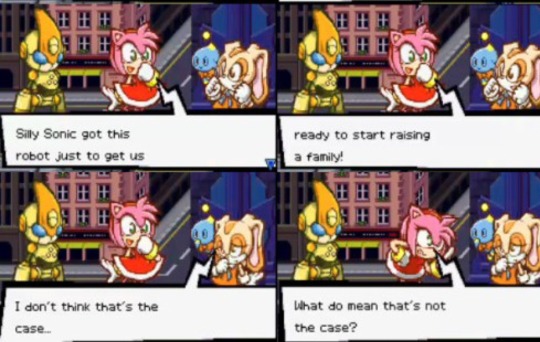
I think it's important to mention that before Battle, we hadn’t gotten a single line of dialogue that implied that Amy tought that her behavior could be hurtful for Sonic, nor did she ever threaten anyone at all unless it was self defense. She knew he didn’t reciprocate her feelings and was actively trying to make him fall for her anyways,sure, but we gotta remember that while the canon ages might have been scrapped recently, at the time Modern Amy was created they were still very much canon and you can tell they had them in mind when writing these characters. Amy was supposed to be 12 ,so it makes sense that she didn't understand why Sonic wouldn’t accept her affection. She idolized him and misinterpreted the fact that he always was protecting her as possible romantic interest,but never actually imposed anything on him. The worst thing she ever did to him was wanting to hug him without consent,and again, the games implied that she clearly didn't realize such a thing wasn't ok. Sonic also didn't seem to want to hurt her feelings so while he did run away and expressed being annoyed by her he never explicitly told her to stop. I actually think that if he had sat her down and made it clear to her that what she was doing was truly bothering him, The Amy from the adventure era would have stopped, but i doubt he cared enough to do that honestly (after all ,in his recap screens it is implied that what truly bothers him about Amy being near him is not her crush,but that he thinks shes exposed to danger.)

BUT in Battle and for the next three games,Amy doesn’t seem to be written as a 12-year-old who mistakes admiration for love anymore. This is where the writers started to portray her as someone who is clearly still young and definitely childish but not innocent. Her whole character revolves around harassing Sonic and using her strength to intimidate others, and don't get me wrong,I like that Amy gets angry easily!! i like that she isn't afraid of a fight,that she complains a lot, and that she isn't peaceful. After all,those are important parts of who she is. But Battle!Amy is on a whole other level: she gets mad at her friends just because they don't agree with everything she does or says. It's not about having a strong personality anymore,she's just generally aggressive. For the next few games she and Sonic can't have one normal conversation that isn't Amy imposing her own wishes over him and him trying to get away from her, so it's hard to believe she wouldn't realize that what's she's doing is wrong nor accidental as we were supposed to before. This time It just feels like she is deciding to ignore the signs.
This continued in advance 3 ,where she literally threatens him with her hammer just cause he shows signs of not being interested in spending time with her when they meet, Then in rush she becomes possesive and jealous the second he mentions Blaze and also seems to treathen him with the hammer in the credits scene because he is running from her hug.
They changed the direction of her characterization again after Rush. The best way i can describe the Amy that is present in Riders,06,etc is one that has two very polarized sides to her personality. On one side,she is a peppy,sweet,over enthusiastic and romantic girl, on the other she is a pretty intimidating one with an obsession with Sonic and very fiery temper. However,contrary to her last portrayal,she is more polite and actually asks Sonic if she can come with him various times,doesn't harass him and doesn't threaten people simply cause they don't agree with her anymore, but she still doesn't seem to have any sense of boundaries,still follows Sonic without permission sometimes and still clearly has no consideration for his personal space. Another thing about this Amy is how her flirting is really intense, and even if she isn't as aggressive as the Amy from Battle,if someone messes a bit with her she doesn't hesitate to resort to intimidation or take her hammer out.

She still gets violent towards Sonic sometimes,but what's different from her last characterization is that instead of doing so merely because he doesn't show romantic interest in her ,its mostly because he doesn't follow on his promises (end of Black Knight) or shows up to save her “properly” (Referring to 1- that scene in Riders where he blows eggman -who had caught Amy- away with wind and she chases him with her hammer because “how could he not think that would hit her too “ and 2- the one in Zero Gravity where he arrives late to save her and she playfully throws him a few fists saying that “it took him long enough!”). I don't think she's necesarily right to do that but i don't consider it to be problematic either, since by that point the games had strongly implied that there was a non-spoken agreement between the two that he'll always show up to save her and the whole thing feels more playful than anything else. Mostly because Sonic seems to be fine with her being around again, as he never really denies her acussations or runs away when she gets mad,and even tries to explain himself to her.
So yeah,this Amy is one of the more famous -and infamous- ones,as her negative and positive qualities are more balanced than the one from Battle. However,i personally don't like her much as there's almost no focus on the empathetic/compassionate side of her character that was so prominent in the adventure era and ,even if i wouldn’t call this version of her a Stalker , she's still is way too obsessive and possesive for my liking. The writing for her character is still pretty much completely based on being attracted to Sonic, to the point that In 06 she tells Silver that, if she had to, she'd “choose Sonic over the world".
In Sonic Chronicles , Amy gets a lot of dialogue. She gets jealous in a scene but its not as bad as in Rush and she tries to make Sonic jealous by inventing a fake boyfriend (terrible trope) but her levels of aggressiveness are up to the player's treatment of her. I am ,however , mentioning this game because of a scene in specific near the final section in which Amy is scared they might die and aks Sonic if she can have a moment with him. She then tries to have a serious conversation and politely asks if he cares about her or if he likes her at all. if the player chooses to make Sonic say he does care for her she is legitimately surprised and thankful. Idk what happens If he rejects her cause i haven't been able to find any recordings of that and i never owned this game,but i'll assume that her reaction won't be too bad considering she is asking in the first place(?) feel free to tell me if you know…

This portrayal of Amy is still present in Unleashed (2008) ,in which Amy is there to cheer/support Sonic on throughout the game and to serve as an important indicator that Sonic is quite self conscious of his looks when he's a werehog. She is generally very sweet towards him in this game (especially when she shows no rejection towards his werehog form,which is a detail i adore), even if she does get annoyed when he doesn't pay as much attention to her as he does to Chip or reciprocate her feelings.
A good example is how, before the last temple ,she asks him if he'd like to go on a date with her after everything is over. If you choose the positive dialogue option she is ,again, positively surprised and thankful. If you make him say no she complains about how he's being mean, but doesn't insist on it and just accepts it.
In Free Riders (2010) ,Amy just generally acts extremely out out of character (like,she doesn't even fit into Battle's portrayal). It really feels like someone who didn't know anything about the character wrote her, so for the sake of the pink hedgie let's ignore it and go back to talking about portrayal 4.
I already mentioned her brief apparition in Black Night and there's nothing worth mentioning about her in Generations so i'll skip them.
This portrayal ended in Lost World (2013),In which they toned down Amy as a character in general,leaving out all of her flaws and iconic traits out. She feels plain and her strong personality,confidence,sass,energy,etc all seem to be completely gone. She's just sweet and that's it . For some reason there's a scene where she literally tries to confess to Sonic and is cut off before she can finish,which is very funny considering it had never been treated as a secret before??? it really goes to show how hard they were trying to pull some kind of reboot on her. Fortunately,this characterization was only a two-game-thing (She is just as plain in Forces (2015)) so i'll put it in the same bag as the Free riders one and we'll leave it at that.
After Lost world came Boom (2014) ,and then we got the most recent change of Amy's personality,which we all know has had a mixed reception from the fandom. Originally people thought that this Amy would stay just in the Boom universe ,but this personality has been showing up in the mainline games for a while now,like in Team Sonic Racing (2019) and Frontiers (2021).

This Amy feels older than any of the ones that came before her. She kept the sass,the love for romanticism,the positive attitude,the confidence and the strenght but her bad temper and over enthusiasm are gone,as she is generally more calm,less energetic and not childish at all. Most importantly,this Amy is extremely emotionally intelligent,as the rest of characters seem to look for her help and advice constantly ( to the point that she has been given the "therapist friend" title by the fandom and is even referred as "the nice one" by Eggman himself ). Another interesting thing about this Amy is that she doesn't flirt with Sonic anymore,In fact, she barely expresses her liking for him (She does so a bit more in Japanese chz the characterization varies) and Sonic seems completely comfortable with this version of her around.
A lot of people say that this version of her is out of character and I completely understand where that comes from, but i must disagree because this characterization of Amy is the first one since the adventure era that focuses on her compassion/empathy rather than on her crush on Sonic, which combined with her intelligence,makes her not out of character,just the most emotionally mature Amy to date instead. I actually think that if the og modern Amy had grown up,this is the kind of personality she would’ve developed while becoming an adult (although she isn't supposed to be one). A good argument to defend this point would be that one Egg-memo you can buy through the fishing minigame in Frontiers where Eggman talks about how Amy has "come a long way" and how it took her some time "to find herself" and get out of Sonic's shadow.
Only problem i have with this Amy is that i wish she was more flawed and bubbly,mostly cause she can come off as very plain from time to time and way too mature. She is a bit too perfect for my taste. I'd like her to mess up more,to not always be so smart,to be more impulsive,a little bit more clumsy,fiery and wild,just so she could have some more of the charm of the original,y'know?
Before i talk about her more recent Videogame portrayal (TMoSTH) i want talk about IDW Amy:
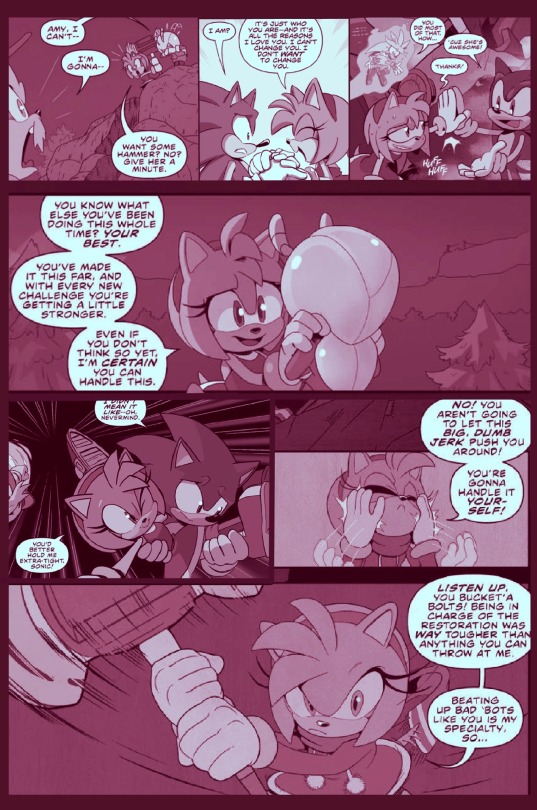
in IDW, all of Amy's flaws and positive traits from past games are balanced pretty well: she is flawed and relatable and can mess up a bit sometimes because of her impulsivity,but she's emotionally and strategically inteligent, optimistic and incredibly kind. She is a great fighter and leader,but also a wonderful friend who offers emotional support. She has a strong personality, lots of sass and can be very aggressive and intimidating towards her enemies, but not any less of an empathetic and compassionate person because of that. Her strength and confidence are pillars for her character instead of nonsensical anger,but she still shows self doubt and fear from time to time. She is energic, idealistic and still a romantic,but not obsessive nor possesive. peppy but emotionally intelligent. She still loves Sonic, but her feelings for him feel authentic rather than childish idealization,and given that she now respects his space,she's written to be happy just with fighting by his side and jokingly flirt from time to time. (their bond also seems stronger,but that's a topic for another day.)
I believe this portrayal of her is one of the best we've gotten in the sense that she represents a good mix of most things that has made her positively memorable since the beginning and lacks every problematic aspect of her character that was added post her creation. And because of this good mix of characteristics, IDW Amy is constantly praised by the fandom. But something i hear a lot is people saying how they love IDW Amy and despise "Main Amy" -by which i'll assume they refer to videogame Amy just in general- and that way of summarizing all of Amy's game portrayals feels very odd to me, especially because IDW Amy is a culmination of every single good aspect that has been added to this character combined with most of what she was meant to be at the start. In other words,IDW Amy couldn't exist if it wasn't for all the game Amys before her.
It's true that in IDW we haven't seen her character be as impulsive and outspoken as in the Adventure era or Heroes, and i miss that as much as every other Amy fan. But I do think that ,because so much assertiveness wouldn’t coexist very well with things like careful thought, the reason for that change must be that IDW is writing an more mature version of the character and It’s hard for them to keep such aspects of her personality intact without her being seen as childish by the audience now that they are paired up with big responsabilities (ex: the restoration) Especially since that super impulsive nature of hers probably came naturally at the time because she was supposed to be a 12-year old and wether we like it or not, it was implied by the narrative that it was one of the main reasons she got caught by eggman both in SA1 and SA2. Aka,IDW Amy isn't allowed to make as many mistakes as the og.
After all ,Amy used to be written to be mostly seen as a comedic character and as an "extra addition" to the main team rather than as an important,needed member of it. ( even in Heroes,where she had formed her own team,she was still trying to catch up to Sonic and his team because she had been excluded of it.) If she made a mistake and got caught by eggman because of her stubborness,the writers would just make Sonix fix things. In IDW she doesn't just feel older,but she has also gotten to have important roles in the fight against Eggman and people rely on her with their lives,so it doesn't surprise me that the writers try to make her be more conscious and careful when it comes to her actions now that she has more responsibilities and can't allow herself to make as many mistakes as she did back when she was written to be more immature and impulsive because of that extreme assertiveness.

Now,I personally believe that Amy in TMoSTH is the same as in IDW, just that she feels more like her OG self in TMOSTH because ,for the most part ,Bday Girl is on that train literally to just have fun and do as she pleases. She doesn't have any weight on her shoulders nor expectations,she is free of responsabilities all the way until the climax of the game and the game itself is very comedy-centric for the most part, so the writers pobably felt like they could set that impulsive,assertive side of her loose again, and i loved it!
In this game her character doesn't revolve around Sonic and she messes up a lot (The way she was so ashamed of how she broke her hammer when she tried to escape the closet with brute force that she lied, how she didn't realize Sonic was actually hurt because she was too excited about the game, how she was overconfident and impulsively tried to solve the case and completely failed ,how she and vector started beating a wall violently after realizing the train was alive,etc),but her positive qualities shine throughout the game as well ( How she took the time to organize a party that she'd think everyone would have fun at,How she is so thankful that everyone showed up and doesn't mind that Shad and Sonic didn't bring gifts, how she makes sweets remarks about others and cute jokes in distressing situations,how she has faith in Shadow's goodwill, The way she delivers the final blow at the end and says that despite everything,she loved the party because it was an adventure,etc ). Throughout the game,Sonic and the rest treat her in a way that really goes to show what a good friend and a lovely person she is ,and she expresses great appreciation for everyone's presence in her life.
It's honestly an amazing coincidence that this game takes place on her bday considering that it's the one that made this portrayal of her "game canon". As a fan of her, i celebrate it and hope we get more of it in the near future.
So yeah, i didn't talk about Sonic X Amy,Archie Amy nor all the comics,series and games that came out between the big videogame titles. There is much more about how Amy has been written that could be said, but i think i did a pretty decent summary of the most important changes her character has gone through the years mainline game-wise,at least good enough to defend my point that she wasn't a stalker originally and she definitely isn't one now. As i mentioned before,i agree that she was portrayed as possesive and obsessive for a long period of time and as an actual harasser for a shorter one , and that we should definitely recognize it and be critical of such things being portrayed as “quirky” and “funny” aspects when they are in reality, hurtful. BUT summarizing her whole character by calling her a stalker and an obsessive fangirl is defining her based on the worst examples of her characterization and ignoring her good ones completely.
Feel free to disagree with my character analysis,my opinions and the way i categorize her portrayals,but i strongly believe that Amy rose isn't meant to be a harasser,an obsessive fangirl or personal space invader.
My girl deserves better.
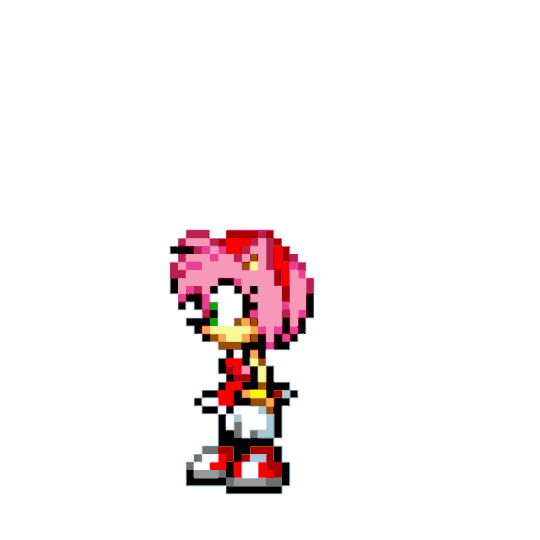
#also don't get me wrong i love battle#is just that Amy is really hard to like in that game#props to her for carrying weights for half of it tho we stan a strong pink rat#if you actually read this whole thing props to you#also thanks anon for giving me an excuse to talk about amy#amy rose#sonic spoilers#character analysis
997 notes
·
View notes
Text
As I immersed myself in the books, watched the show, and even played one of the games, I couldn't help but wonder about the immense popularity of Jaskier among the fan base. Joey Batey's stellar performance in the Netflix series undoubtedly plays a significant role, but that only accounts for his portrayal in that specific adaptation.
Then it struck me.
When it comes to Jaskier, very little information is actually known beyond a few minor facts.
This is everything currently known about Jaskier
1.) Jaskier is an important character, largely depicted through his close friendship with Geralt, which forms a central aspect of his interactions.
2.) A talented bard, Jaskier received his education at Oxenfurt academy, where he graduated with the highest honors as a Master of the seven liberal arts. This suggests that he possesses intelligence beyond what he often portrays.
3.) Originating from the town of Lettenhove, Jaskier holds the title of Viscount, and his true name is Julian Alfred Pankratz Viscount de Lettenhove. The specific location of Lettenhove on the map, however, remains undisclosed.
4.) Jaskier is known to have numerous romantic partners, as the Netflix adaptation even confirms his involvement with both male and female individuals.
5.) Jaskier's loyalty to Geralt knows almost no bounds, and he is willing to make great sacrifices, even risking his life, to ensure Geralt's safety.
6.) Remarkably, despite being one of the few human characters, Jaskier seems to defy the aging process. This intriguing aspect of his character is not just a casting error in the Netflix series but is also referenced in the books, where his youthful appearance compared to his actual age is mentioned
The enigmatic nature of Jaskier's character offers a captivating canvas for fan creations. With limited canonical information, fans can freely explore various backstories and headcanons. Some popular fan theories propose that Jaskier is more than just human, potentially having ties to a non-human lineage. Others imagine a tragic past, where one of his parents, often his father, was abusive, and he grew up with siblings.
In the realm of fan fiction, creative minds have woven tales of Jaskier's immortality, delving into the reasons behind his agelessness. These speculations and many more allow fans to shape Jaskier as a blank slate, utilizing the scarce details available to craft diverse and compelling narratives that align with their own interpretations of the character.
This artistic freedom empowers fans to explore the depths of Jaskier's persona and invent their unique perspectives, making him a versatile and captivating figure in the realm of fan works
#the witcher netflix#joey batey#geralt of rivia#the witcher#jaskier the witcher#henry cavill#the witcher jaskier#geralt x jaskier#geraskier#jaskier#gerskier#cirilla fiona elen riannon#freya allan#headcanon#yennefer of vengerberg#anya cholatra#anya chalotra#the witcher season 3#fic ideas#witcher yennefer#the witcher season three
545 notes
·
View notes
Text
Daenerys' storyline in ADWD is a good way to complexify heroic narratives without invalidating the idealism of the savior. What is in question isn't the morality of freeing slaves (because that's already indisputable), but how to integrate them in society in a effective way when that goes against ancient traditions of subjugation. It offers an honest portrayal of power struggle, how the oppressing class does not give up their power easily, and in order to make a revolution stick you must give the oppressed the necessary tools to keep themselves empowered, the oppressed must be able and willing to reign fire on those who seek to put them in chains again. With heroic narratives there's always an extraordinary someone saving people from certain doom and everyone is happy. the end. But with Dany there's an exploration of the aftermath. Her storyline explores her struggle of wanting to do good, on trying to keep her people safe while dealing with powerful people who seek to maintain their hierarchies. It's an exploration of what power can mean to different groups. Power can be about subjugation but it can also be a way to prevent yourself from being subjugated. The great masters would not have behaved differently if Dany had proposed gradual and peaceful reforms on slavery, because they cared first and foremost about their status as a ruling class, and that status was only possible through the exploitation of other people, because for a group to be above requires all others to be below, stepped on by those above.
#last semester i studied about the process of slavery abolishment in my country during the 19th century#which was a process done mostly through gradual and peaceful reforms#and yet the slave owners still did ALL they could (increasing violence against enslaved ppl + human trafficking) to maintain the system#people who truly believe in slaving others are vile in any scenario. because slavery is vile. there's no way around it.#daenerys targaryen#a dance with dragons#asoiaf#valyrianscrolls#cw slavery
374 notes
·
View notes
Text
Why 'Hoe Culture' is a Detriment to Our Society, Particularly the Black Community.
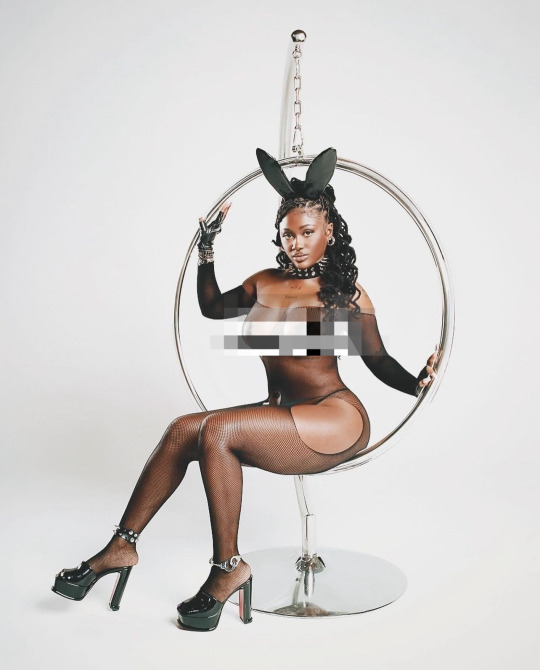


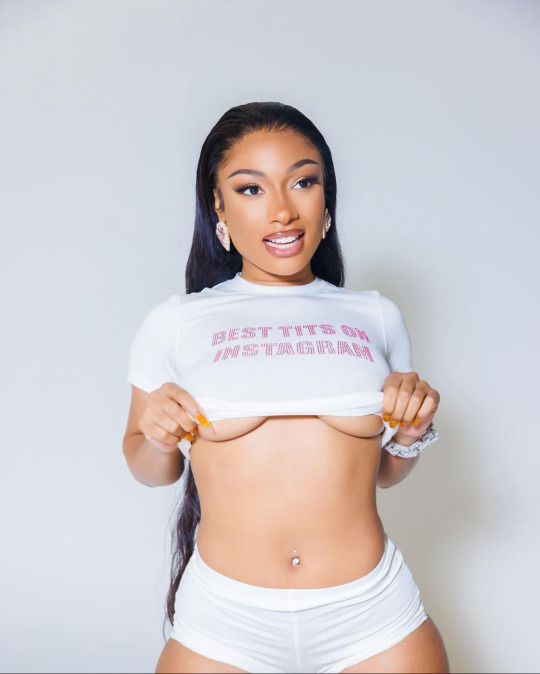
Hey Besties,
Welcome to The Black Feminine Society! We pride ourselves on creating a safe space for Black Women to heal, grow, and embrace their femininity. Our mission goes beyond just creating a supportive environment. We believe it is our duty to have open and honest discussions about the challenges that can be detrimental to our culture, while also shining a light on the right paths for Black women to take.
At The Black Feminine Society, we are committed to holding ourselves and each other accountable. Our goal is not to tear down another Black woman, but rather to empower and uplift one another. We firmly believe that by addressing the issues within our community, we can drive positive change for the greater good.
So let's talk about it…
As 'Hoe Culture' is gaining increasing momentum, particularly within the Black community. It is a matter of grave concern that such a culture is being propagated, especially considering its adverse impacts on the perception of Black women and young girls.
The music industry, a formidable influencer of society, plays a significant role in this degradation. Many lyrics and music videos often depict women as objects of desire, thereby demeaning their worth. This portrayal of Black women is not only disrespectful but also aids in perpetuating stereotypes that have haunted the community for centuries.
The lack of genuinely empowering role models for young girls is distressing. Our society seems to drown out voices that advocate for respect and dignity, while those who succumb to the pressures of being overly sexualized for relevance are amplified. It is heartbreaking to witness the precious innocence of young minds being corrupted by such destructive ideologies.
The propagation of 'Hoe Culture' also distorts the perception of what healthy relationships should look like. It fuels lust over love, leading to superficial connections devoid of real affection or respect. This is not what relationships should represent. Relationships should be about mutual respect, understanding, and love, not superficial attractions.
Also, the media tends to glamorize 'Hoe Culture', conveniently ignoring the trauma associated with it. It is not all fun and games, as they would have us believe. The reality is much harsher, filled with emotional turmoil and personal distress.
This brings us to the concept of trauma bonding, a situation where individuals develop a strong emotional attachment to those who hurt them. It is a cycle of abuse and reconciliation that can lead to severe psychological effects, including low self-esteem and chronic mental health issues.
In the world of social media, especially on platforms like Instagram, young girls often feel pressured to participate in 'Hoe Culture', fearing that they might be ostracized otherwise. Behind the glamorous pictures and seemingly perfect lives of IG models lies a sad reality of mistreatment and deception. It is vital to remember that these are curated images, not reflecting the reality of their lives.
Before I conclude, I want to leave you with a motivating message:
To all the beautiful Black women out there, remember that you are so much more than what society tries to label you as. You are strong, beautiful, and worthy. Your body is your temple, a sacred sanctuary that deserves respect and honor. Protect your heart, keep it exclusive for those who genuinely deserve it. There is no rush to fit into societal norms; remember, it's okay to be selective. Your worth is not defined by the number of likes or followers, but by the strength of your character and the depth of your spirit. Be proud of who you are and never let anyone dim your light.



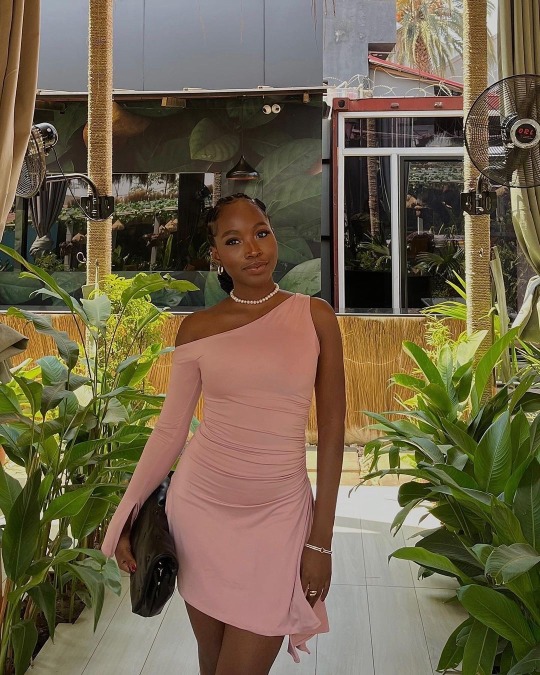
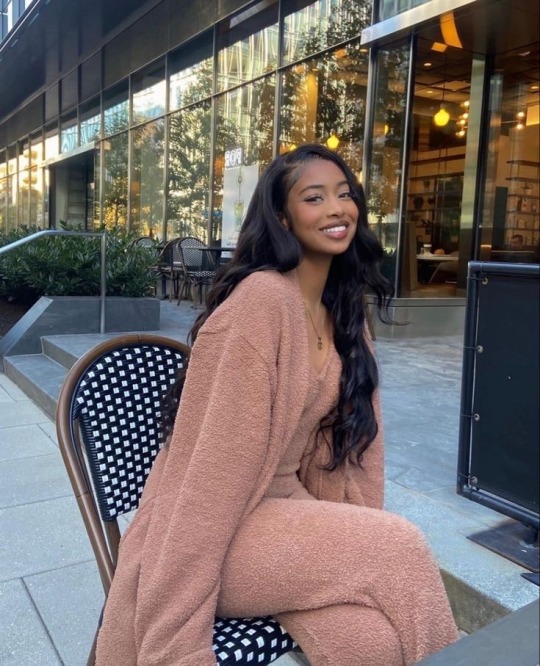
#304 culture#black culture#black woman#black women in femininity#classy black women#open discussion#ho3 culture
57 notes
·
View notes
Text
Why "Unconventional" Daryl Matters
Daryl is my favorite male character on television. In fact, he was the first male role model I had after growing up with men who were always quick to anger, shouting at others, breaking things, and throwing tantrums. Norman's portrayal showed me that men have the ability to choose kindness, tenderness, and true love even if nobody taught them how when they were kids.
Daryl’s “unconventional” masculinity is what makes him so unique. He doesn’t make speeches or push to be the leader. Yes, Rick is a strong character, but I love Daryl because he isn’t Rick or any other male character on the show. Daryl is a trailblazer who breaks several stereotypes. Having spoken to so many other Caryl fans, I know Daryl's backstory and his devotion to Carol give them hope that they too can rise above their trauma.

Because of Norman and Daryl, so many fans feel more comfortable opening up about childhood or sexual abuse despite the stigma surrounding it. Daryl's representation is especially empowering to men who were abused or neglected for not conforming. He showed them what it means to be a kind, emotionally intelligent man. He did that. That's something I hope Norman is very proud of. The writers may have created a powerful emotional arc, but he is Daryl. No other actor could've captured Daryl's nurturing side that effortlessly – sometimes with just a simple look or touch or tone of voice – and balanced it with all of his epic moments. That's all him.
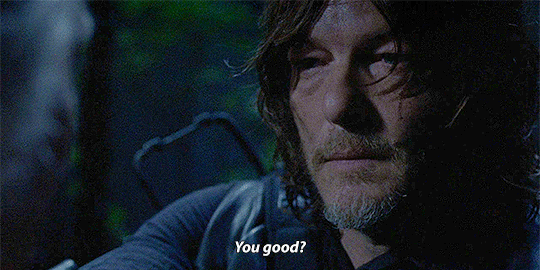
Most people understand that the purpose of my campaign over the past couple years was to demonstrate Melissa's and Carol's vitality to the show, but that's not all. I was advocating for Daryl's character integrity too. His fierce loyalty, vulnerability, and devotion to Carol all make him heroic in my eyes and they all go hand-in-hand, but when Daryl starts questioning where he belongs after spending only a short time with new characters and when his feelings get buried under layers of subtext, then my investment in him starts to feel misplaced, which hurts a lot because of the personal connection I've made with him. It makes Daryl's character growth from a lone wolf to a committed family man seem fruitless if he can just find a "surrogate" family somewhere else. Do I think the story will ultimately lead to Daryl making that choice? No, but my point is, it isn't clear why he could never choose anyone other than Carol and TF. And it needs to be. Norman said Daryl is someone who "wears his heart on his sleeve." That's the Daryl I root for. That's who I want to see more of. I miss him terribly.

Again, Daryl inspired a generation of young men to refuse the toxic male stereotype, and taught them how to choose kindness and how to love fiercely. Daryl’s love for Carol showed so many women that they deserve to be treated with love and respect by their partners. I'm excited to see more of Daryl who knows where he belongs and isn’t afraid to show his love for Carol. I want the trailblazer who stands up for who he is and doesn’t fall into toxic masculine traps – because that ain’t him.
116 notes
·
View notes
Text
Like clockwork, the moment that Sophie is almost surely going to be played by a Black woman there is a sudden uptick in the Sophie should be a man or trans because that would be “true representation” discourse.
Representation for all communities is important(although that’s not what this rally is about), but Sophie Beckett is the last character in Bridgerton who should be gender-bent or made trans since her story is directly tied to her being a working-class biological woman.
It's because she's a woman that her only means of employment is as a maid. It's because she's a woman that she was almost raped by a pack of men. It’s because she’s a biological woman and fears birthing children who will be illegitimate and who may have to go through life as she did that she refuses to be Benedict’s mistress.
You can’t just plop a (white cause that’s what the real issue is) man or a (white) trans woman into her place without changing her story which is unique in the Bridgerton universe and dare I say the most empowering. So while yes it would be nice to see a gay love story on the show or a trans person, Benophie isn’t the couple to turn to for this representation.
And said representation definitely shouldn’t come at the expense of representation for Black women who are rarely shown as love interests or get to be leading ladies in media. Representation for Black women may not be your representation, but it's still representation for an under-represented marginalized group.
Seriously if your idea of representation hinges on the fact that Black women should step aside and wait “our turn”(aka we shouldn't be represented because y'all always come up with some excuse for why it isn't “our turn”) you need to reassess some things because that isn't going to happen any longer.
This also goes out to the people who keep saying that there are “too many” Black people on show therefore Sophie shouldn't be Black when the only Black woman* that has been featured has been Lady Danbury who is a side character who most certainly does not have a happily ever after(HEA).
*I love Queen Charlotte and both India and Goldie’s portrayal of her and I loved the spin-off, but both women are mixed.
Let’s not forget the people who said Sophie being Black would be too “problematic” since she’s slave(she’s not a slave you’re insulting the enslaved when you refer to her as such) while cheering on every other group of women playing Sophie.
That was what some said a year ago when people suggested Sophie could played by a Black woman, but now that it’s coming you’ve moved on from that excuse to needing to see two white men on your screens.
So once again this isn't about representation it's just another instance of fandom misogynoir aka trying to keep Black women off your screens useless we are there to serve you or be tortured.
Cause somehow seeing Patsey getting wiped and raped 23 million times is “powerful” representation, but seeing a Black woman being loved and cared for and getting a HEA with a man who adores her is “problematic.”
Again I do understand the ones who genuinely want to see themselves represented on screen, but to make this much of a fuss about a Black woman in the role of Sophie Beckett, it’s inexcusable.
Reference point to this rant.
#I didn’t want to rock the boat but one must say something#i tried to leave the dragon show fandom and then i am met with this#just bring in Sophie Beckett Shonda and make her Black#sophie beckett#bridgerton#afoag spoilers#fandom misogynoir#benophie#bncommentary
41 notes
·
View notes
Text

beautiful women James
"Captivating Beauty: Exploring the Allure of Beautiful Women Through the Lens of James."
#Feminine allure#Timeless elegance#Inner confidence#Captivating charm#Radiant beauty#Empowering portrayal#Natural grace#Diverse representation#Individuality celebrated#Portrait photography#Striking features#Positive self-image#Empowered women#Unique perspectives#Celebrating womanhood#pretty woman#beautiful women#pretty girl
0 notes
Text
All the bad reviews I have seen of Barbie are about the feminist theme. On google the reviews are split between 1 star and 5. The thing is people aren’t necessarily criticising the feminism but the treatment of men and the patriarchy (as well as saying it shows a matriarchy is superior). If that is the message you got then you did NOT understand the movie.
These reviews make the film about men.
The film isn’t about men or women superiority, it’s about girlhood and how women are treated by both men and women. It also doesn’t say the matriarchy is superior as shown by the ending. Even the men’s roles in the film are about WOMEN (real world and Barbieland).
The film empowers women by embracing them. It’s about accepting different types of women, portrayals of femininity, the choices they make and empowering them. It also shows the effects of toxic masculinity and that it is okay to break away from expectations (shown by Ryan Goslings Ken)
The film doesn’t hate on men because the film isn’t about men.
#in this essay i will#barbie#barbie movie#barbie spoilers#barbie 2023#greta gerwig#barbie movie spoilers#barbie 2023 spoilers#barbie review#barbie meta
174 notes
·
View notes
Text
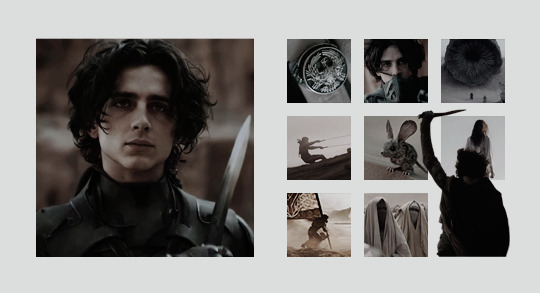
“It’s coming. I see a holy war spreading across the universe like unquenchable fire. A warrior religion that waves the Atreides banner in my father’s name. Fanatical legions worshiping at the shrine of my father’s skull. A war in my name. Everyone is shouting my name.”
⤷ Paul Muad’Dib Atreides. Duke of Arrakis. Lisan al-Gaib.
Paul Atreides was born with two formidable birthrights: the noble lineage of his father, the Duke, and the occultist legacy of the Bene Gesserit, a fanatical religious sisterhood, through his mother. From his early childhood, he was groomed to wield power and was trained not just as a Mentat for his analytical intellect and intuition, but also in the mysterious ways of the Bene Gesserit, whose bloodline manipulation and intense training granted him extraordinary abilities. He not only possesses the art of prescience, which grants him glimpses into the future—a power that both empowers and burdens him—but also wields The Voice, the ability to persuade and command someone with an order.
Now, on the desert planet Arrakis, he seeks vengeance for the brutal massacre on his family and uses the Fremen, the planet’s indigenous people who believe him to be their prophesied messiah, to wage his war against the Imperium. As the prophet Lisan al-Gaib, he leads the Fremen with an iron fist and leaves the rest of the known universe in fear and terror of him and his millions of fundamentalist followers.
“He was warrior and mystic, ogre and saint, the fox and the innocent, chivalrous, truthless, less than a god, more than a man.”
(OOC: Paul’s portrayal is primarily based on the two latest movie adaptations by Denis Villeneuve, but also on Frank Herbert’s novels Dune & Dune Messiah. // 21+, mdni, english preferred, muse =/= mun ‼️ I do not support or celebrate Paul as a white savior. Dune works as a critique toward western exploitation, colonialism and white saviorism, which will be reflected through my portrayal of Paul as well)
50 notes
·
View notes
Note
Responding to your post about fiction affecting reality: very well-written post and that’s something I agree with wholeheartedly!
Full disclosure: I am a Vivz supporter and don’t really interact with the critique community because of negative past experience (hence the anon), but I really liked your post as it was well-researched and brought up a lot of points that I did agree on. Mostly that, as you evidenced, “it’s just fiction” isn’t a great argument for poorly portraying a serious concept when there can be tangible consequences for that portrayal. And you gave some really striking examples.
In terms of Hazbin, it is not that I believe that Val’s portrayal as an abuser (and consequently Angel’s as a victim) lacks any impact, but instead that it adds a positive one. This isn’t something I’ve researched so the evidence I have of this is personal experience, but as you said in your post that media can affect real life I felt inspired to add to that conversation with how it personally affected me.
So I was aware rationally that a common result of abuse/SA is hypersexuality, like I’d seen that on psychology blogs and such but never really understood it. I’m ashamed to say I thought it was a little weird and very rare. Hazbin was what finally challenged that notion with me. Being able to see how abuse looks and attribute those events to Angel’s actions step-by-step made something click in my head. I even remember that shortly after seeing that episode, I apologized to one of my friends (a survivor themselves) over some judgmental comments I’d recently made over hypersexuality. Said friend also watched Hazbin with me and it’s the reason they talk more openly to me now and we’re a lot closer. Val’s “stupid” behavior in the show and mentioned in Vivz’s comments did not lessen the impact that episode had on me, or make it unbelievable to me that Val could be manipulative. If anything I understand more now that abusers don’t always appear as psychopathic masterminds. And I know my friend finds comments like the Mean Girls one funny and they tell me it’s empowering to make fun of Val’s incompetence.
That’s not the only positive influence Hazbin’s had on me, but the most relevant to your post, I believe. It’s the reason I’m often a skeptic on most criticisms, because my lived experience tends to go against them. You said the negative impact of Val was that people are drawing fetish art of him, but the only time I ever see that art is within critic’s posts. It never shows up in my regular feed, so it looks to me like he’s equally as fetishized as every other character; the unfortunate inevitability of the internet. I can’t say I’ve seen anyone post about stories like mine about learning to understand survivors, but I have heard positive stories from survivors themselves in person and online which lead me to believe that the positive impact outweighs the negative.
Fiction has real impact, very true. But consider that might be a good thing in this case.
Thanks for being respectful!
TW: Rape, SA
I'm a victim of SA myself and that's why I wrote all of this post. If you got something positive out of this piece of media, that's great. Same with victims that saw potion and were okay with it- that valid as much as the people that didn't like it at all. I recommend watching many others shows yourself (or movies, books, whatever) will help you out with sorts of topics in bigger ways. I understand you feel like you got something good out if (and I'm glad) but I do need to say, this is minimal in comparison to other media you could consume regarding the topic!
I personally suffer with Hypersexuality, and the treatment in the show (and merch and otherwise) I found completely wrong. Even if you got to a good understatement of the topic, please put research into it (also outside Tumblr for that matter! There are better places to find stuff about!). Thank you also for admitting your faults over your treatment of hypersexuality and apologizing for it. Many people will never let themselves grasp this concept, so thank you.
If you took Valentino's comparison to Mean Girls or Powerpuff Girl as a way of making fun of him, that's you. I found it, personally, terrible. Specially cause many comments regarding that (that I put on the post) were people actively disregarding the topic at hand. Saying that Valentino is just a karen, or He is Bubbles coded, feels so out of the realm of everything (the last one didn't feel like making fun of him). I don't like the comparison of an active sexual predator to a mean high school girl or a kinder garden girl that's regarded as bubblely or dumb. Feel like you should reach into his actions over It feels diminishing to me and other people (who also complained about this themselves).
People should be extremely careful of what they portray about this topic in media. Other stuff written in Hazbin or Helluva Boss regarding R-pe jokes also is extremely disgusting to me. Never forget that if you think this portrayal is ok, one episode apart it's a gang r-pe jokes towards Sir Pen... and an r-pe joke towards Moxxie in Spring Brakers. Which I find extremely disrespectful to do and adds to r-pe culture as much as any other r-pe jokes (general or towards men) in media. Especially when they want to portray it in a serious way with Angel, where was that energy then? (Don't say Viv didn't write that, she liked a tweet about the Sir pen joke, and the spring braker is written by Viv and Brandon.)
Also, about manipulation:
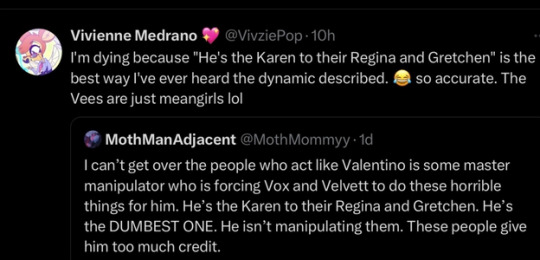
The tweet right below says that "He isn't manipulating them" because he is too stupid to do so. Responding "The Vees are just meangirls" it's crazy to me.
About "You said the negative impact of Val was that people are drawing fetish art of him, but the only time I ever see that art is within critic’s posts. It never shows up in my regular feed"
Val has being fetishized by the crew itself! The person (who is not an SA/r-pe victim said by themselves, who has being open of shipping ValxAngel and being into r-pe porn) is the one that produce the whole poison part of the episode (also based on his previously non canon ValxAngel comic). You could also go throught the people Viv's responds and likes and it's mutuals with, and they also do the same thing as this crew-member (Raph). Congrats that it doesn't appear in your timeline, tho. If this art appears in a critic post, it is because it's being criticized or brought up to make a point.
[It's not on my blog yet, but I don't like receiving double ask in the inbox, specially of anons! Sorry. I don't know if it's the same person or not, and I don't want to end up receiving 5 asks in my inbox again.]
#vivziepop critical#hazbin hotel critical#vivziepop critique#helluva boss critical#helluva boss criticism#vivziepop criticism#hazbin hotel criticism#helluva boss critique
45 notes
·
View notes
Text
Crazy together: Byler, Cthulhu, and cosmic horror
Cthulhu is a queer horror film from 2007 that I've always been fond of. I rewatched it recently and was struck by some of its similarities to Stranger Things: small town vibes, conformity themes, cosmic horror as queer allegory, a gay protagonist with a childhood best friend slash love interest named Mike...
The film has an ambiguously villainous ending for its main character, Russ Marsh, and it's an ending that suits this story pretty well, imo -- so given how much it reminds me of Will's story, I thought it would be interesting to compare the two.
[Content warning for rape and (bloody) attempted suicide, both depicted in the movie and mentioned below the cut.]
youtube
👆 [That's the entire movie available for free on YouTube, courtesy of its director. You don't need to watch it to understand this analysis tho. Spoilers ahead.]
Cthulhu is a (very) loose adaptation of The Shadow over Innsmouth, a cosmic horror story about an outsider who arrives in a small fishing town and unearths a cult that interbreeds with immortal sea-dwelling monsters. He ends up making the horrifying discovery that he's descended from the cult's founder and thus doomed to turn into a monster himself.
The film uses this premise to talk about queerness: As an openly gay man, Russ has always been an outsider and was never going to participate in his hometown's, uh, traditions. Unfortunately, his father is the cult's leader and his sister is infertile -- Russ must participate.
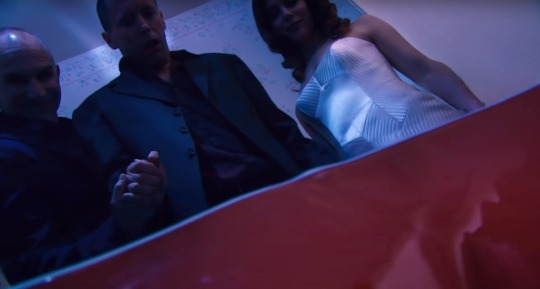
[Yes, that's Cara Buono. If you enjoyed her portrayal of Karen as a loving but deeply conformist family member who does a better job of supporting the status quo than supporting her loved one, but just wished her character was more one-dimensional -- then this is the movie for you!]
Russ doesn't actually know much about the cult at the start of the film -- he fled to the city in his teens and dismisses his father's proselytizing as "Joseph Smith frontier horseshit" -- so it isn't until he returns for his mother's funeral that he begins to unravel the truth.
It's a good metaphor for how it feels to look back on a bigoted or abusive upbringing and realize: wow, that was a lot more fucked up than I thought it was.
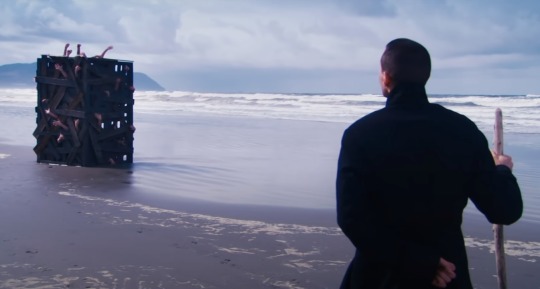
As you might expect from cosmic horror though, this isn't a healing or empowering process for Russ.
Rather, he just keeps running into brutal reminders of how powerless he is in the face of the town's overwhelming, ingrained homophobia: at one point he's raped to satisfy his father's need for an heir; at another he's falsely jailed for the rape and murder of a boy he was trying to rescue from the cult.
It's similar to the torture Will endures in S1 and S2: he's kidnapped and symbolically raped, reflecting Troy's coded "killed by some other queer" comment, then bullied for having the audacity to survive it. He even stands up to a literal eldritch monstrosity and is rewarded for his bravery with yet more loss of autonomy.
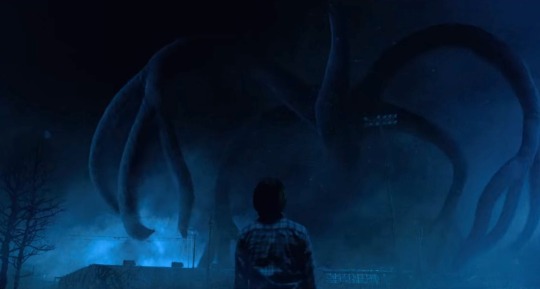
You might be wondering if these stories even count as cosmic horror. Cthulhu only ever vaguely hints at the existence of, well, Cthulhu, and Stranger Things (which deliberately tweaks its genre every season) reveals that the Mind Flayer was basically just some guy all along.
But I think it's a bit of a misconception that cosmic horror is about star-sized masses of eyeballs and tentacles that drive you insane with their inhuman incomprehensibility.
Really, cosmic horror is about powerlessness, inevitability, and comprehending all too well. To know that horrors exist beyond the everyday facade of human existence -- whether they take the form of unknowable monstrosities from the void or of violent bigotry in an otherwise pleasant town -- is to know that your existence is nothing more than a delicate soap bubble floating in a vast, uncaring universe made exclusively of sharp edges. Even if you return to the everyday world, you can never return to blissful ignorance.

And that’s what drives you insane.
Will has something of a knowledge motif following him around: He's a wizard named Will the Wise. He illuminates. He has True Sight. He's a super-spy. He's part of the hive mind. He was studied in the lab. He was violated at school and in a library. His neck prickles when Vecna is close. He knows what Vecna is thinking.
It's too much cursed knowledge for one little boy to bear.
But he doesn't have to bear it alone.
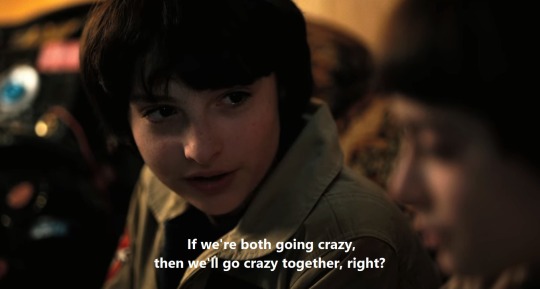
Will is lucky to have a bunch of loving friends and family, and their support does a lot to help him cope... but even his fiercest supporters, Joyce and Jonathan, tend to be absent for long swathes of time. There's only one character who can be consistently found by Will's side through the majority of every season, and that's the boy who promised to go crazy with him.
[Strictly speaking Mike wasn't by his side in S1... but he fought hard to bring him home the whole time they were apart. Tomayto tomahto.]
Russ has a Mike too. (Literally -- his name is Michael Shields lol.) His childhood best friend reconnects with him soon after he arrives back in town and pretty much immediately becomes his sole trusted confidant as Russ falls down the cultist rabbit hole.

A quick aside -- Russ's past with Mike is a glimpse into a possible future for Byler.
Russ and Will have both been saved by their Mikes from giving in to the despair of being treated so brutally by their towns: Russ's Mike caught him mid-suicide attempt when they were teenagers--
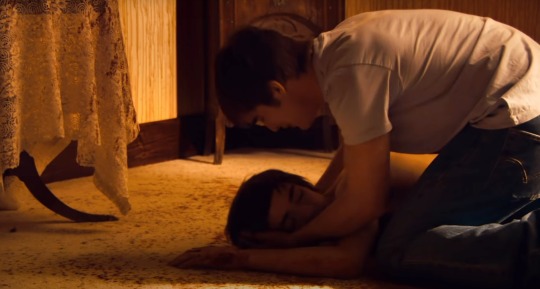
--and Will's Mike, of course, helped rescue him from the Upside Down and sat patiently with him the whole time he was possessed.

Unfortunately, both Mikes are also conformists who are unwilling to leave the safety of comphet. Russ ran away to a more liberal environment where he could exist in peace, but Mike stayed behind and married a woman. This could easily end up being Byler's fate too.
So while Russ and Will might be alive thanks to their Mikes, they now have to live the rest of their lives without the love of the boy who gave them the drive to face it in the first place.
And it isn't as though the boy doesn't want to love him back.
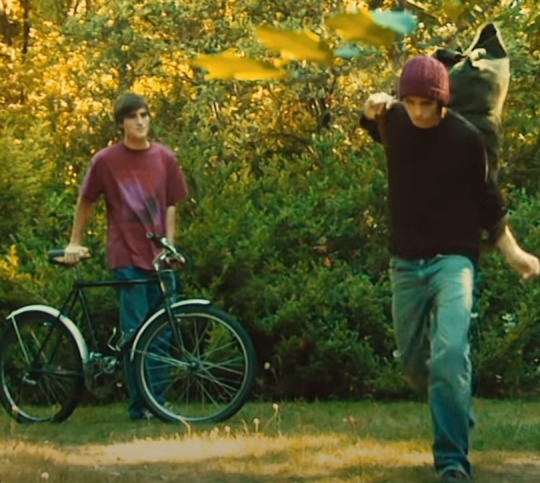
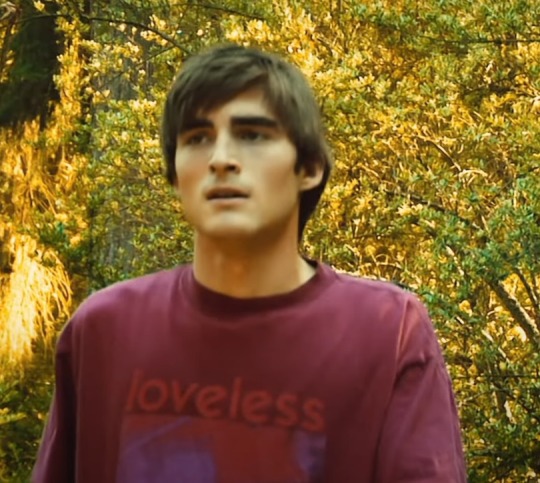
The jury is officially still out on Byler, but Russ's backstory is very much not about a sad gay boy having to get over his sad gay crush on his straight best friend -- it's about a pair of would-be lovers getting torn apart by a town that refuses to let them be themselves.
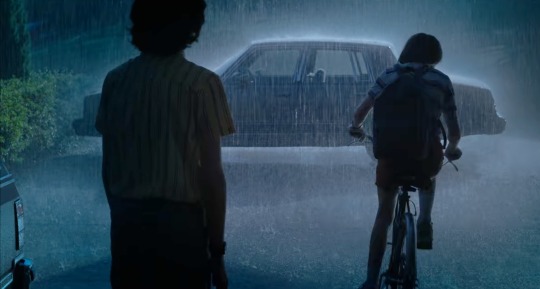
I want to emphasize that both of these pairings consist of a visibly gay guy and a straight-passing guy.
In both stories it's typically the visibly queer one who actually interacts with the horrors, while the straight-passing one tends to observe from a position of relative safety, either escaping before anything too nasty happens to him, or more often, simply learning about the horrors second-hand from the visible one.
(There's one key exception at the end of Cthulhu -- but we'll come back to that.)
This is such an important dynamic that it's even unsubtly foreshadowed in Byler's first scene together:
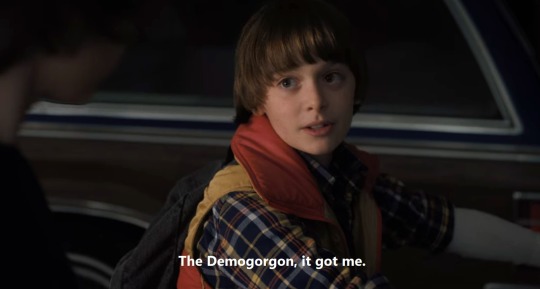

This informs the way the characters support each other. We've already seen the obvious the safe one acts as a mental tether for the endangered one so he doesn't go insane with despair dynamic, but there's a reversal too: the authentic one inspires the conformist to join him in what was never really insanity so much as a different way of looking at the world.
Russ doesn't have any designs on seducing Mike -- much like Will, all he expects is some support from his best friend -- but his dogged questioning of the town's status quo still leads directly to Mike breaking out of comphet and admitting to what he's always really wanted:
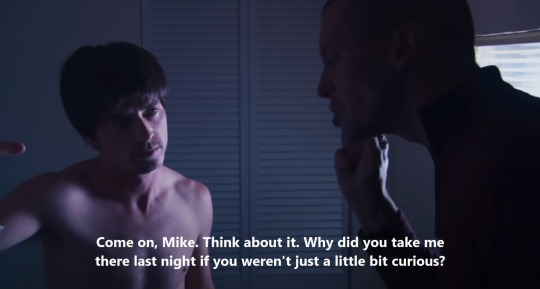
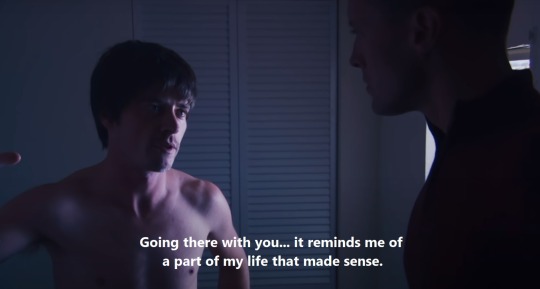
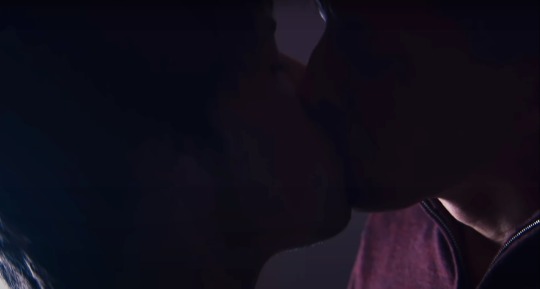
[Learn from your elders, Byers: this is the proper way to respond when your love interest says that home just isn't the same without you.]
But Cthulhu's protagonists are confident adults who know how to quickly resolve their romantic tension. Byler are frightened kids in a five-act coming-of-age story -- their version is a little messier.
Mike has always been inspired by Will, right from the very first episode -- he decided to risk looking for him in the woods because he figured that's what his brave and kind friend Will would do.

The first two seasons thus show us Byler's dynamic at its best: an endless feedback loop of Will's strength and insight inspires Mike and Mike's devotion supports Will. (Very cleric and paladin of them.) But they're still children at this point, and don't really notice the blossoming queerness in their relationship yet.
S3 adds puberty to the mix and oh boy do they notice the queerness now. Too scary no thank you cancel unsubscribe uninstall. Will's bravery falters. Mike devotes himself to the grim duty of having a girlfriend. The loop breaks under the pressure.
They fight about it in the same location that introduced us to their dynamic and call each other out on failing to hold up their respective ends of the bargain:
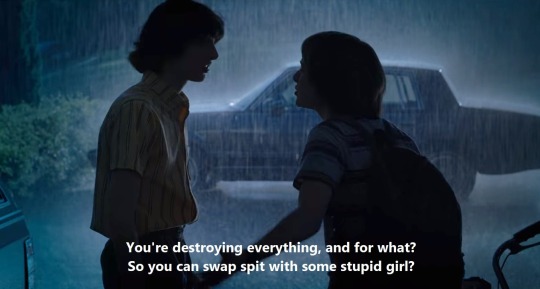
"Why aren't you there for me anymore?"
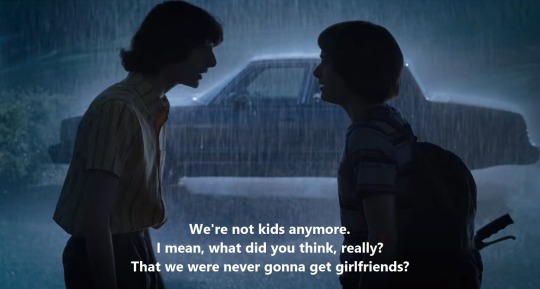
"Why are you refusing to face reality all of a sudden?"
Note that Will's knowledge motif makes a return here -- just before the fight, he dresses up in his Will the Wise costume in an effort to inspire Mike again. But the tone of the scene is silly and cringey -- as correct as Will is to point out that they don't need to abandon their childhood dynamic just because they're growing up, pretending that it isn't going to mature as they age is, um. Unsustainable.
Deep down, Will knows that he'll eventually have to address the terrifying truth that keeps tapping insistently at the back of his neck.
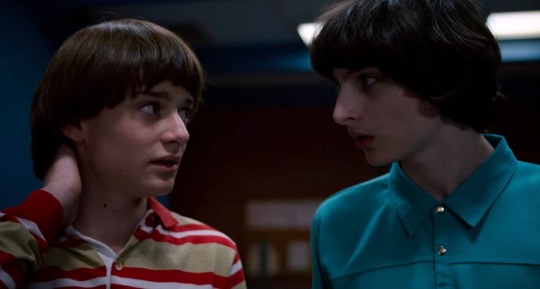
By S4, Mike is starting to come around -- he's still deep in comphet, but he at least recognizes that it's making him unhappy, so he reaches out to Will the Wise for advice. Unfortunately, Will learned the wrong lesson in S3, and all the advice he offers is designed to push Mike back into the arms of comphet.
By the end of the season, Will has even orchestrated a grand heterosexual love confession in the foolish hope that sacrificing his heart on the altar of heteronormativity might finally make the horrors go away. (How's that working out for you, Byers?)
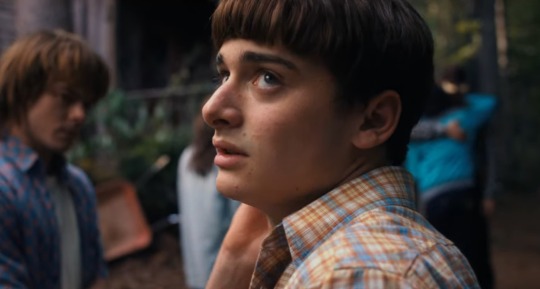

And so we've arrived at that ambiguously villainous ending.
By the climax of Cthulhu, Russ has uncovered the awful truth: his mother was murdered by his father to lure him home, extract offspring from him, and trigger the apocalypse. It's already begun; there's no stopping it. Shambling horrors -- his ancestors -- emerge from the rising sea. Russ is expected to become the immortal leader of this sunken new world.
He and Mike make plans to flee town together, but Russ runs into his father. He's brought to the shore to admire his kingdom before being handed a weapon and commanded to make sacrifice to Cthulhu:

Russ glances between Mike and his father, assessing his options. Soon even the cities will be consumed; he can't Smalltown Boy his way out of this again.
He raises his weapon--
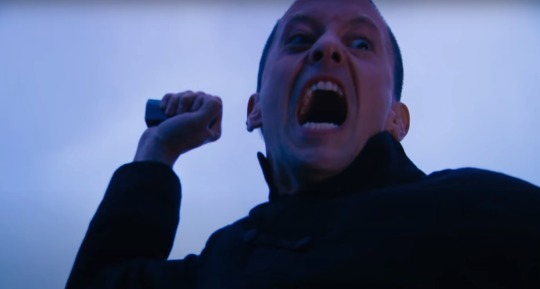
--cut to black, roll credits.
All too often, queer villainy is shown from a straight perspective, presenting queerness as inherently threatening. This is the type of villainy embodied by Vecna: he's a vengeful and predatory outcast who forces his version of reality on others (especially children) and refuses to compromise his dangerous nature.
Cthulhu shows us queer villainy from a queer perspective. Russ, like Will, is harmless: he's kind, has no interest in vengeance, and just wants to live his life in peace. What drives him to villainy is the temptation to throw queerness under the bus in the twisted belief that appeasing the majority is the key to escaping homophobia.
Of course, there is no escape. Sacrificing the man who trusted him to guide him gently into the reality of queerness just means he's succumbed to the madness and become a homophobe himself.
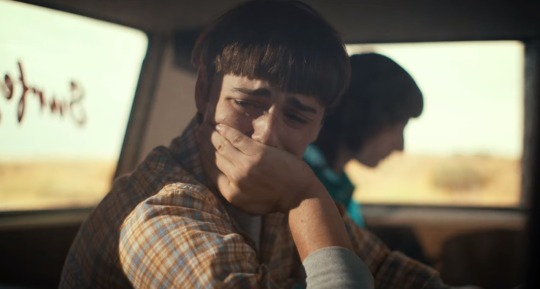
S4 concludes with Will in a similar position to Russ: teetering on the precipice of madness as he helplessly watches the world fall apart at the hands of the villain who would stop at nothing to force him to join his cause.
But where their situations differ is in what cause that villain represents.
Russ's antagonist is a straight homophobe, representing societal homophobia -- far too powerful a force for one man and his lover to have any hope of defeating. But Will's antagonist is that offensively queer-coded-for-straights villain, representing internalized homophobia -- all along, the prickling at the back of Will's neck has been his own instincts warning him of what happens when you allow bigots and abusers to have a say in how you define yourself.
True love can certainly defeat that.
Unlike Russ, Will hasn't reached the end of his story yet--

--and unlike his older namesake, Mike isn't kneeling on the sacrificial altar, but standing by the side of the boy he promised to go crazy with, ready to face the horrors of Hawkins -- together.
[@bylerween2023 day 4 🐙]
#bylerween2023#day 4#psychological horror#cosmic horror#cthulhu#stranger things#byler#will byers#mike wheeler#my analysis#tw self harm#tw rape
61 notes
·
View notes
Text
Trope talks: Mary sue vs not like other girls

In the intricate landscape of storytelling, character archetypes play a pivotal role in shaping narratives and reflecting societal norms. Two such tropes, the 'Mary Sue' and the 'Not Like Other Girls' archetype, have left an indelible mark on how women are portrayed in media. This exploration delves into the rise, fall, and societal implications of these tropes, drawing connections to feminist discourse and the evolution of women's representation in popular culture.
The 'Mary Sue' trope originated in fan fiction, characterizing an idealized and often flawless female character who becomes a focal point, overshadowing the narrative. Originally coined as a parody, the term found its way into mainstream discussions as a critique of poorly developed and overly perfect female characters.
The 'Mary Sue' trope has faced criticism for perpetuating unrealistic standards for female characters. These characters often lack depth and complexity, overshadowing other narrative elements. The trope can contribute to a limited and one-dimensional representation of women in media, reinforcing harmful stereotypes and expectations.
The prevalence of 'Mary Sue' characters has influenced audience expectations and perceptions of female protagonists. As audiences demand more authentic and relatable representations of women, media creators have faced the challenge of redefining female characters beyond the constraints of perfection.
Contrastingly, the 'Not Like Other Girls' archetype emerged as a response to traditional feminine stereotypes. Characters embodying this trope often distance themselves from stereotypically feminine qualities, emphasizing their uniqueness and independence. While intended as a form of empowerment, it can inadvertently perpetuate the devaluation of traditionally feminine traits.
The 'Not Like Other Girls' trope risks reinforcing harmful stereotypes about femininity by implying that conforming to certain standards makes one inferior. This undermines the diversity of female experiences and reinforces a binary view of femininity, pitting 'special' women against those who adhere to more traditional roles.
Feminist discourse has played a crucial role in challenging and deconstructing these tropes. The call for diverse and authentic representations of women in media has led to a reevaluation of character development, pushing creators to move beyond simplistic and limiting portrayals.
The evolution of women's portrayal in media reflects changing societal attitudes. Audiences increasingly demand nuanced and authentic characters who break free from restrictive tropes. The recognition of the limitations posed by the 'Mary Sue' and 'Not Like Other Girls' archetypes signals a broader cultural shift towards more inclusive and empowering narratives for women.
As we navigate the complexities of storytelling, the rise and fall of the 'Mary Sue' and 'Not Like Other Girls' tropes stand as milestones in the ongoing evolution of women's representation in media. The pitfalls of these archetypes underscore the importance of nuanced and diverse portrayals that reflect the multifaceted nature of women's experiences. In the realm of feminist discourse, the journey towards more authentic narratives continues, shaping the future of storytelling and challenging the narratives that have limited the potential of female characters for far too long.
#writeblr#writers of tumblr#writing#bookish#booklr#fantasy books#creative writing#book blog#ya fantasy books#ya books#writing community#teen writer#writing blog#writers#tumblr writers#writblr#writer problems#writerblr#writers community#writers corner#writers on tumblr#writerscommunity#writerslife#writers and poets#new books#book quotes#book#book review#book recommendations#booklovers
26 notes
·
View notes